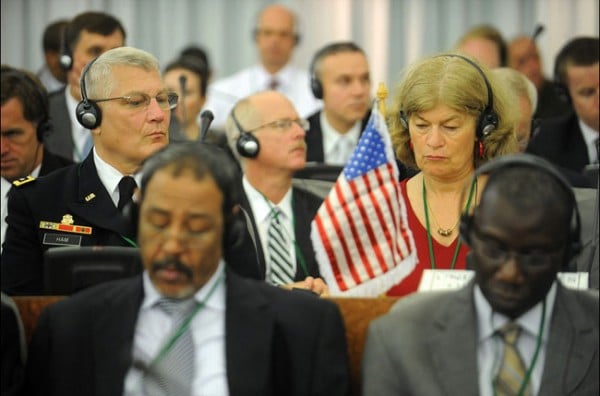
U.S. participates in Sahel security summit, 9/2011
As the Atlantic Community examines “What can the US do to promote security in the Sahel?” the discussion must focus on the importance of U.S. partnerships in the region. Too often, meaningful and successful U.S. intervention to address conflicts and threats to security is erroneously envisioned as a going-it-alone undertaking. It doesn’t have to be – nor should it be – because we have partners in the region with expertise and a vested interest in promoting peace and stability.
Regarding the instability in northern Mali, separatists rebels are threatening to divide the country and create a “failed state” which could destabilize its neighbors. As recent news reports confirm, “al Qaeda’s North African wing AQIM, [is] sparking fears the region would become a launch pad for attacks on the West.” Since 2009, there has been a troubling increase of narco-trafficking in the Sahel where smugglers use older model jets to transport cocaine from Venezuela to West African ports (an undertaking dubbed “Air Cocaine”). Vast networks take advantage of the ungoverned regions of the Sahel and transport the drugs through the region to Europe.
The U.S. can’t ignore these crises nor can we solve them alone. We have friends and allies in the region who can be our partners in the pursuit of lasting solutions. Last month, in fact, a senior Defense Department official confirmed that a key part of U.S. strategy in the region is to establish “effective partnerships to prevent and respond to conflict and [other threats to] stability wherever it manifests.”
Morocco is the kind of “effective” U.S. partner who has its “act together” and could realistically help the U.S. find solutions. Last year, the U.S.-Morocco Strategic Dialogue was launched to provide a framework for regular, substantive collaborations on political, economic and cultural issues. The challenge for the U.S. State Department will be to make sure that this partnership ends up being more than a diplomatic communiqués factory, but a real, effective bilateral tool for addressing common threats and challenges and strengthening counterterrorism and conflict resolution efforts.
The U.S. can also demonstrate its leadership by pushing to end needlessly prolonged obstacles to regional cooperation, such as the nearly 40-year-old Western Sahara dispute between the Polisario Front, an Algerian-backed Cold War era separatist movement, and Morocco. Despite repeated calls by the United Nations Security Council to enter good faith negotiations with Morocco, the Polisario Front refuses to negotiate the details of the current autonomy compromise proposal on the table. (Their obstinacy not only prolongs the conflict but ignores the expressed will of hundreds of thousands of Sahrawis who live in the territory – as well as thousands who have escaped the Polisario-controlled refugee camps over the years – who support the compromise autonomy proposal, vote in Morocco’s elections and enjoy the protections of Morocco’s constitution.) Resolving the Western Sahara conflict through providing autonomy for the territory while preserving Morocco’s sovereignty has been the policy of the United States during the Clinton, Bush and Obama administrations and Democratic and Republican majorities in both houses of Congress have reiterated their support for this formula on numerous occasions.
The U.S. should also support Tunisia, because it can be an effective ally down the road as their democratic transition progresses. After the fall of Tunisia’s Ben Ali, President Obama declared that “we face a historic opportunity” and “it will be the policy of the United States to promote reform across the region, and to support transitions to democracy […] Tunisia was at the vanguard of this democratic wave.” Two years later, while the U.S. has committed more than $350 million to support Tunisia during its democratic transition, it has not taken full advantage of this historic opportunity. The U.S. State Department should enhance and provide greater funding of aid and capacity building programs to support proposed initiatives aimed at improving entrepreneurship and creating jobs – vital tools in rebuilding Tunisia’s economy and promoting social development.
The U.S. must then encourage our partners to work together by increasing intra-regional cooperation in the Maghreb, which is almost non-existent. The nearly one-thousand mile Moroccan-Algerian border has been closed for almost two decades and economists estimate that it costs Morocco alone two percent of its GDP in lost trade and tourism. Increasing this cooperation — by removing obstacles like the Western Sahara conflict and supporting democratic transition – will further empower leaders like Morocco and Tunisia to pursue real reform across the region.
At this critical time for the countries in the Sahel – and for U.S. interests in the region – success will depend on the strength of the partnerships that the U.S. establishes and our unwavering willingness to support our allies’ efforts and work with them to resolve obstacles to real progress.